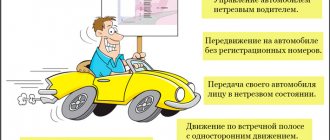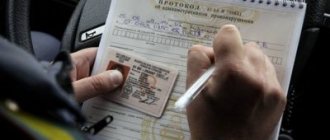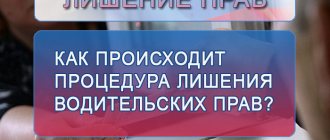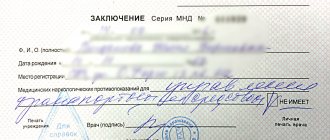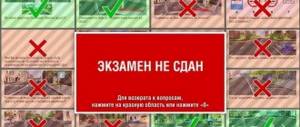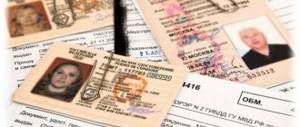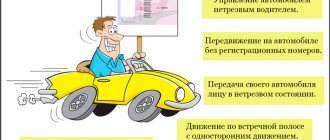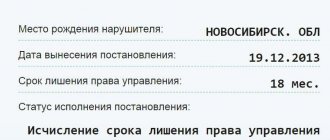Recently, accidents on the roads have become more frequent. Most cases are caused by taking alcohol or drugs on the eve of a trip or while driving a vehicle. Therefore, the government has tightened penalties for drunk driving. In 2018, the violator is promised deprivation of rights for alcohol intoxication and considerable penalties. In this article, we will take a closer look at the mechanism for detaining a motorist while intoxicated, the amount of the penalty and the process of confiscating a driver’s license.
Allowed amount of alcohol in 2018
In order not to lose your license for driving while intoxicated, you need to clearly know the prescribed norm of permissible alcohol intoxication. The test can be done in two ways, by measuring the amount of alcohol in the blood or in the air. It is measured in mg/l or ppm. That is, the number of milligrams of alcohol per 1 liter of blood or exhaled air.
It is important not to confuse these values! The maximum permissible alcohol limit while driving is 0.16 mg/l or 0.35 ppm
If you exceed the limit, a person may lose his license for drunk driving.
The devices used by traffic police inspectors can make measurements in ppm and mg/l. You should be very careful when undergoing the examination by checking the exhaled air. The numbers are very different from each other, but in fact indicate the same level of alcohol intoxication. Unscrupulous inspectors can take advantage of this and extort a bribe.
General information
Alcoholism in Russia is a problem that is recognized at the state level, and it is not surprising that the authorities are trying to combat it with harsh methods.
The appearance of a drunk in a public place is strictly prohibited, and if a tipsy citizen gets behind the wheel of a car, the consequences can be the most unpredictable, even leading to an accident with a large number of victims.
Therefore, traffic police inspectors have the right to stop drivers, and in case of suspicion of intoxication, to conduct a rapid analysis and draw up violation reports when confirming the condition.
The main indicator of the level of intoxication is ppm - proportionally depending on the strength of the drink, the physical condition of the driver and the amount drunk.
Previously, the law did not allow alcohol levels in the driver’s body at all, and severe penalties were imposed for detecting any level other than zero.
Usually it consists of a large fine and deprivation of rights, and this not only gives the driver time to realize the offense, but also disciplines him well, minimizing such violations in the future.
What it is
In 2013, the authorities reconsidered their attitude towards intoxicated drivers and made amendments to the Code of Administrative Offences, which established the possibility of having a certain amount of alcohol in the body, which could arise due to an error in the device or the use of certain products that also cause an increase in alcohol levels.
Thus, drivers who drank alcohol the day before, or simply used mouth spray, or ate foods containing small amounts of alcohol, were able to avoid being fined and avoid punishment.
Since high levels of ppm in the body significantly reduce the driver's concentration and ability to react to a sudden threat, as well as to drive adequately, serious sanctions were introduced.
In addition to fines amounting to tens of thousands of rubles, it is also practiced to deprive drunk drivers of the right to drive vehicles.
While the period of imprisonment lasts, the person does not have the legal opportunity to drive, and thus more clearly realizes his own guilt.
How much alcohol should be in the body (normal)
Despite the fact that alcohol has a bad effect on the driver’s consciousness and his ability to drive a car, a certain standard has been adopted that differs for different types of analysis.
If the inspector detects alcohol in a person’s blood, the level of which does not exceed the permitted level, then he will be released and he will be able to continue driving without any sanctions.
Thus, although the ideal indicator would be 0 ppm, at the legal level it is established that liability for the driver occurs only if more than 0.16 ppm is detected in the exhaled air.
That is, it is precisely this permissible rate of less than 0.16 ppm that can be considered normal for drivers.
When the inspector needs more accurate information, he sends the driver for examination to a medical center, where blood is taken for analysis, and with such a test it is not permissible to detect more than 0.35 ppm.
If the real figure, again, exceeds this figure, then the appropriate sanctions prescribed by law are applied to the driver.
What causes it?
The standard was established in order to level out the error of breathalyzers used by traffic police inspectors, since the error also often led to the imposition of punishment for absolutely sober drivers.
But also, having listened to doctors and their opinion about some products that initially do not contain alcohol, but affect its level, it was decided to increase the norm to reasonable limits.
Thus, the driver who ate a sandwich with black bread or an overripe banana will not be deprived of his license, and on the contrary, the one who drank alcohol before leaving will definitely be punished to the fullest extent of the law.
Deprivation of rights allows you to protect other road users from a possible threat associated with an emergency situation caused by intoxication.
At the same time, increasing the ppm makes it possible to avoid previously existing errors in determining the driver’s condition and recognizing a sober motorist as drunk.
What regulations governs
The violation associated with the driver’s intoxication is clearly stated in Articles 12.8, as well as 12.27 of the Code of Administrative Offenses of the Russian Federation.
It states that if, when checking with a breathalyzer for the degree of intoxication, the traffic police inspector has the right to issue a fine or deprive of rights, but at the same time, the measuring device itself must be certified and have documents confirming compliance with standards; if there are none, then the penalty can be safely appealed.
In addition, if the violation is committed repeatedly or drunkenness leads to an accident or even death, then the Criminal Code of the Russian Federation comes into play, Article 264.1 of which states that in this case the driver will not only be obliged to pay a fine of hundreds of thousands of rubles, but will also receive a prison sentence for several years, so if you are caught drunk driving once, you should not drive again after drinking alcohol.
Procedure for deprivation of license for drunk driving
Only a court can deprive a driver of his rights; an inspector can only temporarily remove him from driving a vehicle. Thus, the inspector must identify the violator, conduct an examination and send documents to the court.
Don't take my word for it! Always check the device data, otherwise you risk losing your license for unjustified intoxication
On-site inspection by a traffic police officer
To impose a punishment for drunk driving, a law enforcement representative is obliged to carry out the appropriate procedure at the place of arrest:
- Remove the driver from driving if there are external signs of drunkenness.
- Measure the level of alcohol intoxication using special instruments, taking into account all errors.
- Draw up a protocol in the presence of two witnesses.
- If the driver does not agree to undergo the procedure described in the second paragraph, the inspector must accompany the offender to a medical examination, where the examination procedure will be carried out in the presence of two witnesses.
If the suspect's intoxication is not confirmed, the traffic police officer is obliged to return the driver to his car.
Checking the degree of intoxication in a medical facility
If you refuse to have your alcohol intoxication assessed on site, you will be sent for a medical examination. It is worth noting that only a doctor who has undergone the required training and has a certificate to confirm this can do this. The medical examination process goes like this:
- The act records the name of the suspect, passport details and protocol number.
- A search is carried out for clinical signs of intoxication.
- A test is carried out to determine the concentration of alcohol vapor in the exhaled air.
- The driver is sent for a blood or urine test.
- Enter all data into the inspection report.
Refusing a medical examination is highly discouraged, because such an action is equivalent to an admission of a violation and leads to the deprivation of a driver’s license for alcohol.
The court hearing is the last resort
If, based on the results of the examination, you are found to be drunk, then all the documents go to court. Typically, this means that your rights will be revoked. Proving the opposite is practically impossible in practice. After the court makes a decision on deprivation of your license for driving while intoxicated, you must independently submit your license to the traffic police department within 10 days. The period will begin to count from the date of delivery of the driver's license
The court will determine the punishment
Conditions for successful defense in court for deprivation of rights
Almost all administrative charges for which the penalty of deprivation of rights is applied are considered in court. The only exceptions are significant violations of the speed limit, confirmed by video cameras. Directly when drawing up a protocol on an offense, it is necessary to perform a number of actions that will help achieve protection in court:
- require traffic police officers to confirm their authority to draw up procedural documents;
- achieve the involvement of a lawyer in the case, since the right to a lawyer arises from the moment the protocol is drawn up;
- make sure that all circumstances are included in the protocol completely and correctly, indicate objections and additions in your own hand (if necessary);
- receive a copy of the protocol signed by an authorized traffic police official.
Note! Even before the case is scheduled for trial in court, you can file a complaint against the protocol. This procedure must be carried out with the mandatory participation of a lawyer so that the court takes into account all the essential circumstances of the case.
Is it possible to win a court case for deprivation of rights? Protecting interests in court should also be accompanied by the assistance of a lawyer or attorney. Only in this case can you count on a positive outcome. During the trial in the first instance, the car owner and the lawyer can use the following defense options:
- Confirmation of procedural violations when drawing up protocols or conducting special procedures. For example, violation of the procedure for sending for a medical examination and conducting it in medical institutions;
- Identification of cases of missed deadlines for bringing to justice. Often the materials of administrative cases are not transferred to the court for a long time, which makes it possible to dismiss the case;
- Exclusion from the case materials of inadmissible evidence used by traffic police officers to confirm the fact of the offense. For example, it is often possible to exclude certificates of examination based on the results of the use of breathalyzers or video recordings.
All arguments and objections presented by the driver and his lawyer in court must be fully reflected in the minutes of the meeting. This will make it possible to use the option of filing an appeal against the deprivation of rights to a higher court.
What happens if a driver is caught drunk driving?
The Code of the Russian Federation on Administrative Violations, namely Articles 12.8 and 12.26, provides severe penalties for drunk driving. If the driver was prosecuted for the first time, the liability in 2021 will be as follows:
- collection of a fine of 30 thousand rubles;
- deprivation of rights for drunkenness for a period of one and a half to two years.
A sober driver will face the same punishment if he hands over the steering wheel to a drunk person.
If a driver caused a traffic accident while intoxicated, the court has full authority to imprison him for 5 years, or send him to correctional labor for 4 years.
If caught again, the fine will increase to 200-300 thousand rubles, and the deprivation of a driver’s license for alcohol will be extended to 3 years.
What to do if you do not agree with the accusations made
Deprivation of a driver's license, both for the first and subsequent times in 2021, can only occur during a court hearing. Unfortunately, very often there are cases when traffic police officers make false accusations. It is necessary to carefully monitor the progress of the examination procedure and not sign the protocol if there are disagreements. If you are confident that you are right, you should call your lawyer, he will help you avoid undeserved punishment.
Violations that may be committed by traffic police representatives at the place of arrest. They may be the reason for canceling the protocol:
- There were no witnesses during the examination.
- The protocol was drawn up in non-compliance with the prescribed standards.
- Testimony from witnesses was collected retroactively. Neither they saw you nor you saw them.
- At honey The institution where you were tested does not have the appropriate license.
If you are sure that you were driving a vehicle completely sober, and you are deprived of your license to drive while intoxicated, hire a lawyer and prepare arguments in your favor.
If you notice such deviations from the law or other oversights, feel free to go to appeal the punishment. This can be done within 10 days after the resolution is submitted. Necessary documents for the appeal procedure:
- Act on suspension from driving vehicles.
- Sobriety test paper at the scene of arrest.
- Inspection data.
- Document on administrative violation.
- Evidence of witnesses in writing.
Appeal against deprivation of a driver's license
Is it possible to appeal the deprivation of rights if the court of first instance does not take into account the essential circumstances of the case? If the magistrate court makes a decision to impose administrative liability, the lawyer and the driver can file an appeal against the deprivation of a driver’s license. Appeal against deprivation of rights occurs according to the following rules:
- the period for filing a complaint is 10 days from the date of receipt of the judicial act;
- an appeal against the decision of the magistrate is addressed to the district court, but it must be sent to the institution that considered the case at first instance;
- the car owner will be notified in advance in writing about the acceptance of the complaint for proceedings and the appointment of a meeting.
How advisable is it to challenge court decisions, since the course of the sentence is suspended for the entire period of consideration of the complaint? This can only be determined based on the characteristics of a particular case, when the court of first instance did not take into account the arguments of the defense and committed significant violations of the norms of procedural and substantive law.
The most common cases where it is possible to challenge the deprivation of rights in an appeal include:
- consideration of procedural documents in the case after the expiration of the statute of limitations for prosecution;
- refusal of the trial court to accept written and material evidence presented by the car owner;
- unmotivated disregard by the court of the arguments of the lawyer and the driver;
- violations of substantive and procedural law when considering the case on the merits.
If the appeal is upheld, the decision of the trial court is subject to cancellation, and the sanction in the form of deprivation of rights is annulled.
Return of driver's license
Those who have been deprived of their license for drunkenness must re-pass an exam on their knowledge of the theory, that is, traffic rules. You can sign up for surrender only after half the sentence has passed. After a successful exam, you must pay off all debts to the traffic police and undergo an examination, after which you will be issued a medical certificate. This document indicates that you can drive a vehicle.
Having collected all the necessary documents (certificate of deprivation of rights, court decision and passport of a citizen of the Russian Federation), go to the department where the driver’s license is located. You must be there in person.
